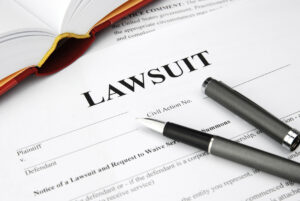
Put succinctly, in personal injury law, a claim is an abstract legal right to financial compensation for a personal injury. That means economic damages, probably non-economic damages, and maybe even punitive damages. Typically, a personal injury claim arises from someone’s misconduct, particularly negligence.
A lawsuit, by contrast, is a legal procedure whose purpose is to enforce your personal injury claim. In this way, all lawsuits are based on claims, but most claims never generate a lawsuit. Even most of those that do ultimately result in private settlements.
Settlement

Settlement is a private, voluntary resolution of a claim. The defendant might agree to pay the victim $40,000, for example. In exchange, the victim will agree to forever abandon their legal claim against the defendant.
As long as you reach an agreement, you can settle at any time, even during a trial. Settlement is by far the most common resolution of a personal injury claim, but a lot of things have to happen before reaching a settlement (see below).
Initial Consultation
Just about any personal injury lawyer will offer you a free initial consultation. Since personal injury lawyers don’t get paid unless they win, an initial consultation is where they determine whether your claim is worth bothering with. If they agree to take your claim, you can be certain that they believe they can win it.
Preliminary Investigation
A lawyer will perform a preliminary investigation of your claim by, for example:
- Asking you questions at an initial consultation;
- Requesting documents from you, such as a waiver of liability form that you signed;
- Interviewing witnesses;
- Requesting copies of your medical records;
- Obtaining a copy of the accident report, if any; and
- Photographing the scene of the accident that injured you.
Your lawyer might perform many other actions as well.
The Demand Package
A demand package is a demand letter plus supporting documents, typically sent to the insurance company responsible for paying your claim. The demand letter states your case, demands damages, and may or may not mention a specific dollar amount. Think of the demand package as the starting point of negotiations.
Negotiation
If the defendant flatly refuses to negotiate, you might have to proceed directly to a lawsuit. Usually, though, what you get is a ‘lowball’ offer that amounts to far less than half of the true value of your claim.
Beyond that, it often comes down to a ping-pong game of offer and counteroffer until you reach a settlement, the defendant refuses to negotiate further, or you get sick of it all and file a lawsuit.
Litigation
If negotiations stall, it can be a good strategy to file a lawsuit even while still hoping for a settlement. A pending lawsuit is good leverage that you can use to enhance your bargaining power.
Filing a Lawsuit
“Filing a lawsuit” means:
- Submitting a formal written complaint to the clerk of the appropriate court.
- Paying the filing fee, which can add up to hundreds of dollars or more.
- Using official channels to formally notify the defendant of the lawsuit and their opportunity to respond (“service of process”).
You must file a lawsuit before the statute of limitations deadline expires.
Pretrial Discovery
Pretrial discovery is a court-supervised evidence-gathering procedure that allows you to demand evidence that is in the possession of the defendant and (sometimes) third parties. The defendant can demand evidence that is in your possession.
Pretrial discovery offers both sides three main legal weapons:
- Interrogatories: Written questions the other side must answer in writing and under oath. The general deadline for a response is 35 days after receipt.
- Depositions: Out of court, under-oath Q&A of witnesses. Depositions typically take place in a law office outside the presence of a judge. Most depositions are videotaped.
- Demands for the production of physical evidence. The defense might even demand that you submit to a medical examination conducted by one of their doctors.
Courts have the power to sanction uncooperative parties.
Mediation
Mediation is where a neutral third party tries to help two opposing parties come to an agreement. A mediator cannot force an agreement. Judges often require parties to make a good-faith attempt at mediation before they will schedule a trial.
Mediation works better after pretrial discovery, as both sides have enough evidence to work with at that point.
Trial
Trial, if you get that far, involves the following stages:
- Voire dire (competitive jury selection);
- Opening statements by each side’s lawyer;
- Examining and cross-examining witnesses, and submitting evidence;
- Closing statements by each side’s lawyer;
- Jury instructions;
- Jury deliberations; and
- Announcement of the verdict.
If both parties waive a jury trial, the judge will decide the case. Either way, you typically have just a matter of days to appeal (exact deadlines vary).
Hire Legal Expertise With Zero Upfront Cost – Book Your Free Consultation
At this point, you might not be sure whether you have a viable claim. Even if you do, you might not know how much it is worth. You’re not going to find out by just surfing the internet; contact a Lakewood personal injury lawyer from Matos Personal Injury Lawyers at (720) 912 7274 for a free initial consultation to get the process started.
